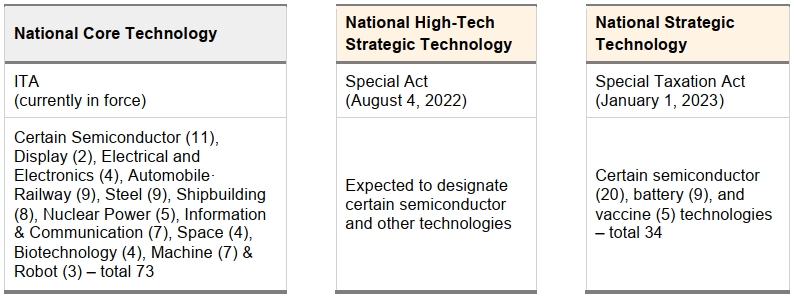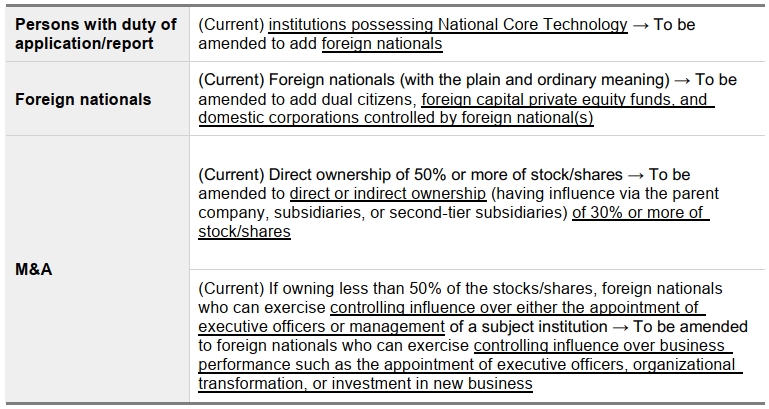In recognition of the growing importance to the economy and national security of securing core technologies and the infrastructure to support technology supply chains, the Korean government has revised its policy framework to respond to changes in the global technology protection environment. As part of this effort, the Korean government announced its "Technology Protection Strategy under Global Competition for Technology Hegemony" (hereinafter, the "Protection Strategy") at the National Policy Coordination Meeting held on December 23, 2021, which was presided over by the Prime Minister.
According to the Protection Strategy, the government will seek to integrate various protection measures that have been established and implemented by different government ministries into a single unified "Korean technology protection strategy." This signals the government's commitment to mobilize all of its ministries to preemptively and strategically respond to attempts by industry latecomers to unlawfully access Korea's core technologies. The Protection Strategy aims to "strengthen the competitiveness of industries and the country through protection of core technologies and a virtuous cycle of human resources" by implementing various strategies and objectives, such as (i) establishment of a proactive protection system for core technologies, (ii) prevention of leakage of core human resources and establishment of a virtuous cycle of human resources in Korea, and (iii) strengthening of inter-ministry cooperation, especially in areas of international trade in technology, and requiring detailed implementation plans from the relevant ministries.
In addition, a new Act on Special Measures for Strengthening and Protecting the Competitiveness of the National High-Tech Strategic Industry (hereinafter, the "Special Act") was promulgated on February 3, 2022 and will take effect on August 4, 2022. Under the Special Act, specific technologies that (i) have a significant impact on national and economic security, such as stabilization of the supply chain, and on the national economy, such as export and employment, (ii) have growth potential, technical difficulty and industrial importance, and (iii) have a significant ripple effect on related industries, will be newly designated and protected as "National High-Tech Strategic Technology," which is expected to include certain semiconductor and battery technologies. The government will provide a package of support to industries that research, develop or commercialize National High-Tech Strategic Technologies or that produce and commercialize products and services based on National High-Tech Strategic Technologies (hereinafter referred to as the "National High-Tech Strategic Industry"), including (i) expedited processing of governmental approvals or licenses, (ii) establishment of infrastructure (i.e., priority support for industrial infrastructure in a designated special area), (iii) rapid processing of administrative complaints, (iv) funding, and (v) tax benefits.
The tax benefits under the Special Act are linked to the amended Restriction of Special Taxation Act (the "Special Taxation Act"), which will take effect on January 1, 2023. Under the Special Taxation Act, certain technologies will be newly designated as "National Strategic Technology," and tax benefits will be provided to companies (including foreign-invested enterprises) that research, develop or commercialize National Strategic Technology in Korea. Such tax benefits will apply to (i) costs incurred after July 1, 2021 for R&D relating to National Strategic Technology, and (ii) investments incurred after July 1, 2021 in facilities to manufacture products using National Strategic Technology, even if the facility also manufactures other products, as long as National Strategic Technology products constitute more than 50% of the facility's output. The Ministry of Economy and Finance announced in its press release dated July 26, 2021 that certain semiconductor, battery, and vaccine technologies will be designated as National Strategic Technology under the Special Taxation Act, and the proposal has been reaffirmed in the proposed amendment to the Enforcement Decree to the Special Taxation Act published in a press release dated January 6, 2022.

If certain technology is designated as a National High-Tech Strategic Technology, it shall also be deemed as National Core Technology under the Act on the Protection of Industrial Technology and Prevention of Divulgence (the "ITA"). This means that even if the government does not provide any R&D funding of the technology, any export of National High-Tech Strategic Technology from Korea and any M&A involving a company possessing National High-Tech Strategic Technology will require prior approval by the Minister of Trade, Industry and Energy (MOTIE).
Details of the Protection Strategy
The key details of the Protection Strategy are as follows:
1. Establishment of proactive protection system for core technology
A. Expansion of new designations of core technologies and implementation of a "sunset" system
Due to the continuing need to designate new core technologies for protection by the government as well as to revoke such designations, and to take into account the technological environment, domestic and international level of technology, and changes in economic value of technology, the government plans to (i) expand the scope of National Core Technology to additional critical technologies that have achieved global competitiveness through designating such technologies (e.g., semiconductors, displays, batteries, and materials/parts/equipment); (ii) regularize the timing of new designations, changes, and revocations of National Core Technology designations, and (iii) formulate and implement procedures for revoking the designation of National Core Technology (i.e., a technology sunset system) after a certain period of time (5-10 years depending on the technology). The government plans to amend the designation of National Core Technologies in 2022 to implement the above.
B. Introduction of system for registering institutions possessing National Core Technology
The government plans to introduce a registration system for institutions holding National Core Technologies. Such registrations are designed to prevent unauthorized export of technologies, unauthorized M&A's by foreign entities, evasion of determination of possession of National Core Technologies, and failure to undergo compliance audits, and to secure effectiveness of National Core Technology protection measures. The institutions subject to registration will be those that have been identified as an institution in possession of National Core Technology through export history (e.g., export of National Core Technology, M&A by foreign entities, and determination of National Core Technology) and institutions where the government requested registration (including subcontractors that have acquired National Core Technology by means of joint R&D, contract manufacturing, etc.). The government plans to implement registration by amending the Industrial Technology Protection Guidelines in 2022 and will establish a legal basis for the introduction of the mandatory registration system and sanctions provisions by amending the ITA in 2023, the primary statute governing the protection of National Core Technology.
C. Expand the scope of application to include M&A's involving foreign companies
In order to prevent technology theft through M&As by foreign entities, the government plans to add foreign nationals to the list of those who are required to report or seek approval of M&As with any institution possessing National Core Technology, and to expand the scope of foreign nationals and M&As subject to government approval. The government has indicated it will amend the ITA in 2023 to achieve the above.

2. Prevention of leakage of key personnel and establishment of a virtuous cycle of human resources
In order to prevent the leakage of National Core Technology experts and the leakage of technology by former/current employees and employees of subcontractors, the government plans to (i) establish a database of National Core Technology experts in 2023 to constantly monitor their job changes and travel to and from Korea (priority implementation toward the workforce requested by the industry with consent to the provision of personal information, and expanded implementation through amendment of laws and regulations), (ii) provide incentives to core personnel to prevent the leakage of National Core Technology jointly owned or jointly developed by a principal company and its subcontractors and to encourage the long-term service of the subcontractors' core personnel, and (iii) establish measures in 2022 to prevent the exploitation of technology by foreign experts.
3. Strengthened cooperation among ministries and cooperation for international trade in technology
First, the government plans to establish a center for reporting the leakage and infringement of industrial technology; to enhance cooperation around the relevant agencies' windows for reporting technology leakage and infringement; and to strengthen cooperation between relevant ministries during the survey/investigation of technology leakage by, e.g., using Korean Intellectual Property Office (KIPO) patent databases to identify institutions possessing National Core Technology and to conduct compliance audits and collect and investigate information on technology leakage. KIPO already announced on January 23, 2022 that it will start building a database this year by analyzing the relevance of new patent applications to National Core Technologies and granting industry-linked classification codes.
Second, the government will establish and jointly announce mid- and long-term technology protection plans for each ministry in the short term; and establish an integrated management system for technology security across all ministries through the "Technology Protection Consultative Organization."
Finally, the government will strive to comprehensively improve cooperation for technology trade across semiconductor, investment assessment, ICT, energy, and other fields, in accordance with the Korea-U.S. Summit Agreement by, e.g., strengthening consultation channels among the Korea-U.S. trade authorities; cooperating with respect to export control policies related to semiconductors; discovering and promoting semiconductor technology cooperation projects; and continuing to operate the Korea-U.S. investment assessment working group and to share investment assessment policies.
In line with intensifying global competition for technology hegemony, the government has expressed its strong commitment to prevent the leakage of core Korean technologies to foreign countries. The government is expected to closely monitor violations and strictly enforce laws in the future. Therefore, companies that may be handling such core technologies in Korea are strongly advised to monitor any amendments to the relevant laws and regulations (e.g., export control laws), and to ensure compliance with these laws and regulations in their work.
Related Topics







